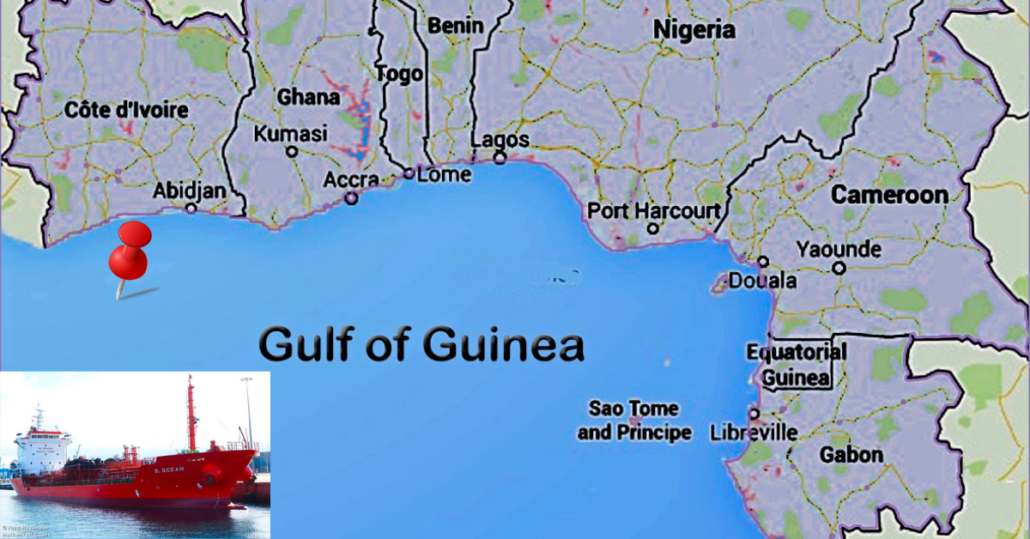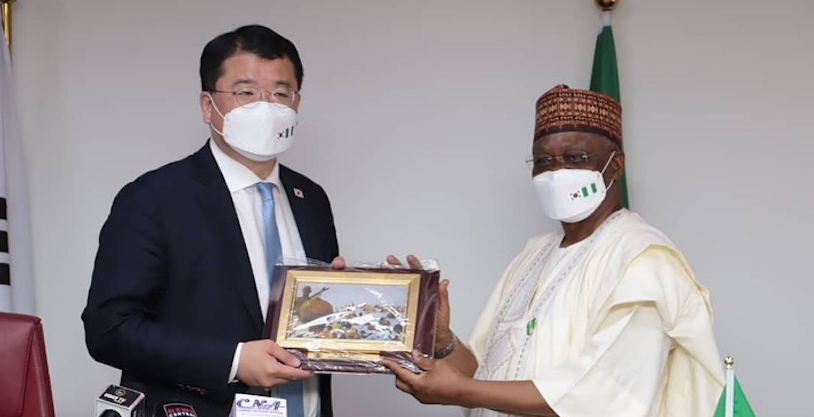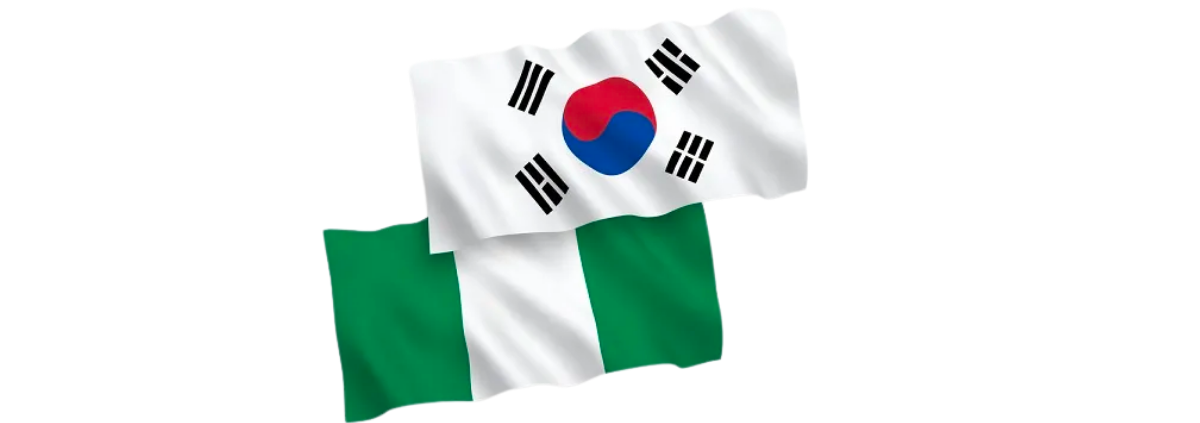South Korea – Increasing Focus on Security in the Gulf of Guinea
Attack on Korean owned Vessel
At approximately 2315 hrs UTC on Monday, 24 January 2022, the Marshall Islands-flagged product tanker MT B Ocean was boarded while drifting approximately 59 NM SSW of Abidjan (Click to read the full report). Between nine and eleven pirates armed with guns boarded and hijacked the tanker. All crew members were taken hostage and held initially on the bridge before being moved to the crew mess area. All communication and navigation equipment was switched off and the bosun was instructed to paint over the vessel name written on top of the bridge (This is possibly a reference to the IMO number that all vessels are required to have on the uppermost level of the superstructure).
The pirates were heard communicating with a probable mother vessel before they then navigated the tanker using their own GPS equipment to rendezvous with another vessel. While en route, the bosun was told to prepare the manifold where the ship-to-ship transfer (STS) operation commenced. Once the tanker had rendezvoused with the second vessel, the chief officer and bosun were told to commence ship-to-ship (STS) operations. After approximately six hours, the cargo transfer concluded, and the second vessel departed. Before leaving the tanker, the hijackers stole crew cash, personal belongings, and ship’s properties. The Korean owners, Ocean Marine Holdings Co Ltd care of manager SK Shipping Co Ltd of Seoul, South Korea, operated the vessel as a bunker vessel.

History of Attacks on Korean interests
South Korea, although not the most frequently impacted nation by piracy in the Gulf of Guinea, has a growing presence in the region and an increasing frequency of being victimised by maritime criminals in the area. The following are some of the events relating to S Korean assets and interests in the region:
2013 – 03 February. Oil Product tanker MT Gascogne, hijacked off Ivory Coast. Lost contact with the vessel since 0800hrs UTC on Sunday, 3 February, off Cote d’Ivoire 70nm south of Abidjan. Luxembourg flagged and French-owned, the vessel was on charter to South Korea’s SK Shipping. The vessel and 17 crew were released on 06 February. 200 tonnes of its cargo of diesel fuel was stolen, and two crew members were injured.
2016 – 11 February. Combined chemical and oil tanker MT Maximus was hijacked by 6 armed pirates off Cote d’Ivoire approximately 76nm South of Abidjan. Five crew reportedly kidnapped as the remaining crew secured in the safe room. On 17 February, MAXIMUS was lying more than 200nm off the Nigerian coast. It was suspected that she was waiting for a receiving tanker to arrive at an RV position. The next day at around midday it was reported that she was alongside another tanker some 60nM off the coast of Akwa Ibom. The vessel’s crew of 18 comprised of mariners from India, Pakistan, China, South Korea, Sudan, and Ghana.
2018 – 26 March. Two Ghanaian flagged fishing vessels Marine 711 and Marine 707 were attacked by Nigerian sea pirates while operating 27 nm from South Cape Saint Paul/Anloga, Ghana. The attackers left the vessels on 28 March taking five mariners with them (Captain, Chief Officer, Chief Engineer of Korean nationality, other two are Ghanaian and Greek). On 28 Mar 2018, the Owners confirmed that the fishing vessel has been released and it is sailing to a safe port. Three crew members were reported missing.
2020 – 03 May. Senegalese-flagged fishing vessel Amerger VII 36nm off Libreville, Gabon. Three crewmen were kidnapped – two Senegalese and a South Korean. On 6 June, pirates released the six hostages after receiving a ransom.
2020 – 24 June. Ghanaian flagged fishing vessel, FV Panofi Frontier was boarded by an unknown number of attackers approximately 60nm South of Cotonou. Two skiffs were seen in the vicinity. The attackers kidnapped six crew (five South Koreans and one Ghanaian) and escaped. The 5 South Korean victims were released on Friday, 24 July 2020 in Nigeria.
2021 – 19 May. Ghanaian flagged tuna fishing vessel FV Atlantic Princes was boarded 65nm South of Tema resulting in the kidnap of 5 crew – Captain- Korean, Chief Officer- Chinese, Second Officer – Chinese, Chief Engineer – Chinese, Bosun – Russian.
2021 – 31 May. Ghanaian flagged fishing vessel FV Iris S, IMO number 8210493, was attacked by armed men in two speedboats, forced to stop, and then boarded 108nm South Cotonou. Stole ship’s and crew property as well as kidnapping five members of the crew; Captain, Chief Officer, Second Officer, and Chief Engineer – all S. Korean and the Engineer – a Filipino.
Expanding Economic and Security Ties between South Korea and Nigeria
South Korea has significant economic interests in the region, primarily in the energy and construction sectors, which in the case of the latter, Nigeria accounts for more than half of South Korea’s foreign construction sales in Africa. (Read more here)

In August 2021, during a visit to the region, South Korea’s First Vice Minister of Foreign Affairs, Mr. Choi Jong Kun, said maritime safety in the Gulf of Guinea “is a very important issue to us”. While briefing journalists in Abuja on the outcome of his visit to Nigeria he went on to say “I met the (Nigerian) transport minister, Rotimi Amaechi and he informed me of what the Nigerian government is doing to ensure maritime security. Transnational security is a very important issue to us, especially safety in the Gulf of Guinea”.(Read more here)
Confirming that South Korea would be hosting the Korea-Africa forum in December 2021, he revealed that he anticipated an expansion of cooperation between his country and African states, saying discussions and collaborations would expand in many areas, including economy, trade, and culture.
Furthermore, The Nigerian Minister of Transportation, Rotimi Amaechi, stated on 22 August 2021 that the Federal Government of Nigeria will collaborate with the Republic of Korea on some aspects of the Integrated National Security and Waterways Protection Infrastructure also known as the Deep Blue Project (Read more about it here). A statement also signed by Eric Ojiekwe, Director, Press and Public Relations quoted the Minister as saying. “We met in my office and discussed quite a lot that has to do with maritime relationships, especially the Deep Blue Project. We concluded to collaborate, and he promised some support and assistance from the government of the Republic of Korea”.
The First Vice Minister, expressing concern about the expansion of maritime kidnapping in the region, went on to confirm his country’s interest in the Deep Blue Project. Referring to his country’s strong fishery and maritime presence in the region, he stated that South Korea was concerned about the security risks posed by operating in the region, saying “So, we want to partake in securing our fishing industry in the Gulf of Guinea whereby cooperating with the Government of Nigeria. That we will do”.
Promising to support the Nigerian government in tackling maritime insecurity, the diplomat disclosed that the Korean government would host a joint commission with Nigeria in October 2021 in Seoul, Korea, saying “We want the Minister of Transportation to be part of the Joint Commission so that in Seoul, we will talk about maritime security on the Gulf of Guinea.”
Further evidence of the growing importance of the region to South Korea can be seen in their recent donation of a security vessel to Nigeria’s Deep Blue Project, noting the transfer of this vessel is currently delayed due to financial constraints within the Nigerian Maritime Administration & Safety Agency (NIMASA).
Summary
Piracy in the Gulf of Guinea is a cause for great concern among all seafaring nations but particularly among those with significant economic interests such as South Korea.
With investment in the energy sectors increasing in the region (particularly in the LNG sector which is increasing in significance due to events in Europe), potential opportunities for South Korean companies will continue to increase. With this however will also come pressure for countries such as Nigeria to ‘raise their game’ with regards to dealing with piracy.
Indeed, now that South Korea has joined the ever-growing list of countries offering assistance to combat the region’s security challenges from piracy, the pressure to address the fundamental and underlying causes of the piracy problem in the region, especially in Nigeria, will be greater than ever.


